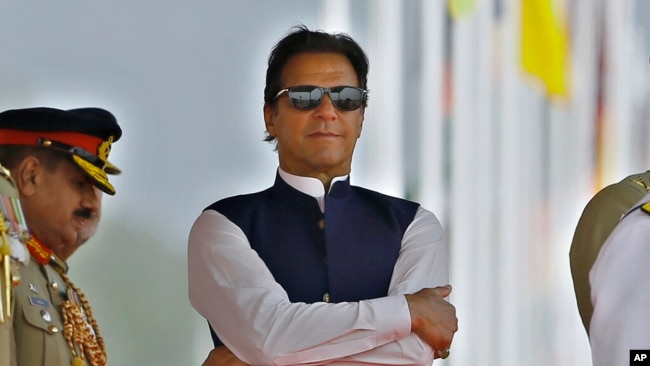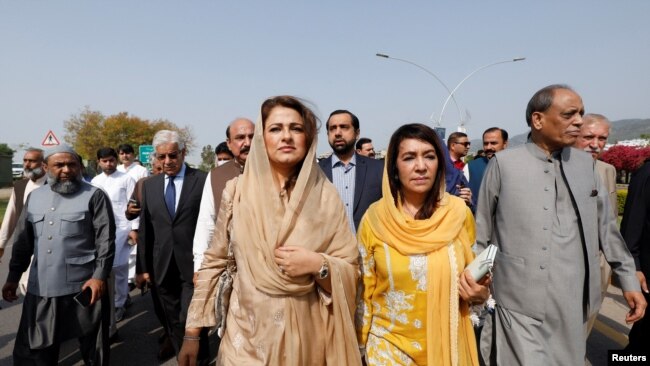ISLAMABAD —
Pakistani Prime Minister Imran Khan has survived an opposition-led effort to remove him from office through a controversial no-confidence vote in parliament.
As soon as the 342-member legislative National Assembly or lower house of parliament, began its much-awaited session to consider Khan’s removal, Law Minister Fawad Hussain urged the acting house speaker to outlaw the vote for allegedly being sponsored by the United States.
The minister in his brief speech cited an article of the Constitution that says, “Loyalty to the state is the basic duty of every citizen.”
Speaker Qasim Khan Suri ruled that he could not allow voting on what he said was an illegal no-trust motion against the prime minister.
"No foreign power shall be allowed to topple an elected government through a conspiracy,” Suri said, as he swiftly adjourned the special session amid
The U.S. has denied any role in the effort to unseat the prime minister.
A State Department representative while commenting on Sunday’s developments and renewed charges of U.S. interference told VOA there was “no truth” to these allegations.
“We are closely following developments in Pakistan. We respect and support Pakistan’s constitutional process and the rule of law,” the representative said.
Opposition members refused to leave the chamber and in a mock exercise arranged their own proceedings to vote on the no-confidence motion, in which they claimed 196 members voted against Khan, well beyond the simple majority need to oust the prime minister.
Opposition leader Shehbaz Sharif denounced Suri’s ruling and ensuing actions by Khan, saying they were in violation of the Constitution. “It is nothing short of a high treason,” he tweeted, saying Khan “has pushed the country into anarchy.” Sharif accused Khan of committing treason for subverting the Constitution and demanded treason proceedings against him under relevant constitutional provisions.
Bilawal Bhutto Zardari, leader of another opposition party, also accused the government of violating the constitution. “Our lawyers are on their way to Supreme Court. We call on ALL institutions to protect, uphold, defend & implement the constitution of Pakistan,” he tweeted.
Shortly after the adjournment of Sunday’s session, Khan addressed the nation, saying he has advised the president of Pakistan to dissolve the National Assembly and call for fresh elections.
The president, Arif Alvi, dissolved parliament. Elections will be held in 90 days.
Khan has dissolved his Cabinet and under the Constitution, he will act as a caretaker prime minister for the next 15 days. He has written a letter to the opposition leader, inviting him for mandatory consultations on forming a caretaker setup that will oversee the elections.
The political crisis prompted the chief justice of Pakistan, Umar Ata Bandial, to conduct an emergency hearing into opposition allegations and adjourned the proceedings until Monday morning.
Khan defended his actions in line with the Constitution. He reiterated his allegations that the no-confidence vote was a “foreign-orchestrated” conspiracy to bring down his government.
Later Sunday, in a televised speech to his party leaders, Khan said the Pakistani ambassador in Washington was told by a senior U.S. official whom he identified as Donald Lu, in a March 7 “official meeting” that Islamabad would face “serious consequences if the no-confidence vote fails.” Lu is the assistant secretary of state for the Bureau of South and Central Affairs at the U.S. State Department.
On Friday, Pakistani officials confirmed they had formally issued a demarche or official diplomatic note to the acting U.S. ambassador in Islamabad in protest over Washington’s alleged interference in Pakistani politics.
When asked if the embassy had received the demarche, a State Department representative told VOA that “as a standard practice, we don’t comment on diplomatic correspondence.”
“In terms of U.S. involvement in Pakistan’s internal affairs, there is no truth to these allegations,” the representative said. The State Department also said, “We are closely following developments in Pakistan,” adding, “We respect and support Pakistan’s constitutional process and the rule of law.”
“The country's highest security body endorsed it [the conspiracy],” Khan said, referring to a meeting he chaired Thursday of Pakistan’s National Security Committee comprised of top civilian and military leaders.
Pakistan’s military spokesman, Major-General Babar Iftikhar, told VOA the military was not planning to issue any statement on the political upheavals, reiterating his institution had nothing to do with Sunday’s political happenings. The statement effectively dismissed widespread speculation that a military intervention was imminent.
Khan came to power in the 2018 general elections as the head of a coalition government with a thin parliamentary majority because his Pakistan Tehreek-e-Insaf (PTI) party fell short of winning a simple majority. In recent weeks, about two dozen PTI lawmakers have abandoned the government, along with key coalition partners, leaving Khan without enough votes to defeat Sunday’s no-confidence vote.





No comments:
Post a Comment